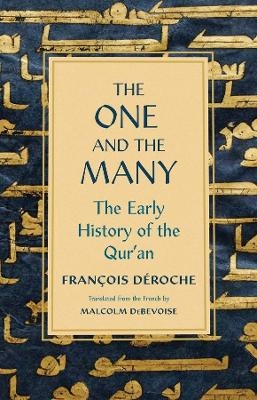
The One and the Many
The Early History of the Qur'an
Seiten
2022
Yale University Press (Verlag)
978-0-300-25132-6 (ISBN)
Yale University Press (Verlag)
978-0-300-25132-6 (ISBN)
A revelatory account of early Islam’s great diversity by the world’s leading scholar of early Qur’anic manuscripts
“There is no one better placed than François Déroche to write the history—and tell the story—of how the Quran went from words uttered by Muhammad to inviolable canonical scripture. This is a meticulous, lucid, and fascinating book.”—Shawkat Toorawa, Yale University
According to Muslim dogma, the recited and written text of the Qur’an as we know it today scrupulously reflects the divine word as it was originally sent down to Muhammad. An examination of early Islamic sources, including accounts of prophetic sayings, all of them compared with the oldest Qur’anic manuscripts, reveal that plurality was in fact the outstanding characteristic of the genesis and transmission of the Qur’an, both textually and orally.
By piecing together information about alternative wordings eliminated from the canonical version that gradually came to be imposed during the first centuries of Islam, François Déroche shows that the Qur’an long remained open to textual diversity. Not only did the faithful initially adopt a flexible attitude toward the Qur’anic text, an attitude strikingly at odds with the absolute literalism later enforced by Muslim orthodoxy, but Muhammad himself turns out to have been more concerned with the meaning than the letter of the divine message.
“There is no one better placed than François Déroche to write the history—and tell the story—of how the Quran went from words uttered by Muhammad to inviolable canonical scripture. This is a meticulous, lucid, and fascinating book.”—Shawkat Toorawa, Yale University
According to Muslim dogma, the recited and written text of the Qur’an as we know it today scrupulously reflects the divine word as it was originally sent down to Muhammad. An examination of early Islamic sources, including accounts of prophetic sayings, all of them compared with the oldest Qur’anic manuscripts, reveal that plurality was in fact the outstanding characteristic of the genesis and transmission of the Qur’an, both textually and orally.
By piecing together information about alternative wordings eliminated from the canonical version that gradually came to be imposed during the first centuries of Islam, François Déroche shows that the Qur’an long remained open to textual diversity. Not only did the faithful initially adopt a flexible attitude toward the Qur’anic text, an attitude strikingly at odds with the absolute literalism later enforced by Muslim orthodoxy, but Muhammad himself turns out to have been more concerned with the meaning than the letter of the divine message.
François Déroche, professor at the Collège de France, is the world’s foremost authority on early Qur’anic manuscripts and a leading scholar of the history of the Arabic book. Malcolm DeBevoise has translated more than forty works from French and Italian in every branch of scholarship. He is a three-time winner of the French-American Foundation translation prize for nonfiction.
| Erscheinungsdatum | 08.03.2022 |
|---|---|
| Übersetzer | Malcolm DeBevoise |
| Zusatzinfo | 23 b-w illus. |
| Sprache | englisch |
| Maße | 140 x 216 mm |
| Themenwelt | Geschichte ► Teilgebiete der Geschichte ► Religionsgeschichte |
| Geisteswissenschaften ► Religion / Theologie ► Islam | |
| ISBN-10 | 0-300-25132-7 / 0300251327 |
| ISBN-13 | 978-0-300-25132-6 / 9780300251326 |
| Zustand | Neuware |
| Informationen gemäß Produktsicherheitsverordnung (GPSR) | |
| Haben Sie eine Frage zum Produkt? |
Mehr entdecken
aus dem Bereich
aus dem Bereich
Von den Anfängen bis zur Gegenwart
Buch | Hardcover (2022)
C.H.Beck (Verlag)
34,00 €
Herkunft, Blüte, Weg nach Osten
Buch | Hardcover (2024)
C.H.Beck (Verlag)
39,00 €


